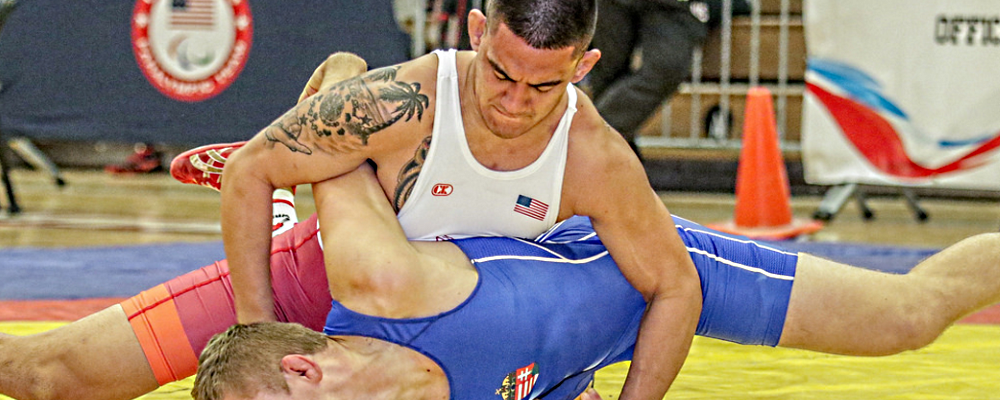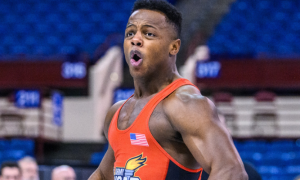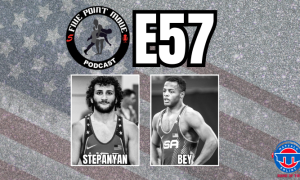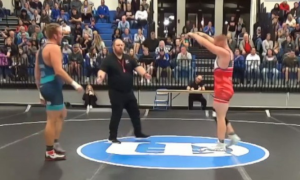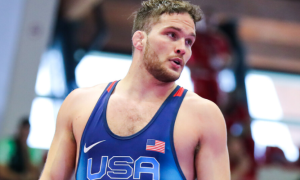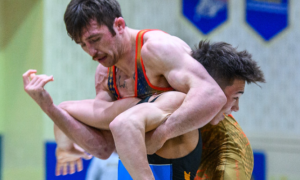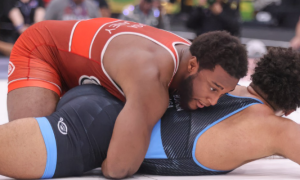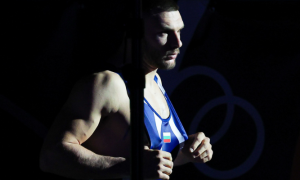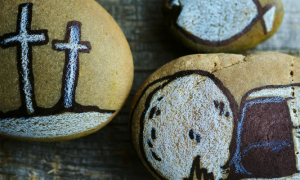No, Anthonie Linares (71 kg, NYAC-OTS) does not operate in anonymity. It isn’t as if the kid from San Jose goes about his business unnoticed before returning to his dorm at Northern Michigan, only to reappear every so often come tournament time. That just isn’t how it works. With a 2015 University National title under his belt and an impressive runner-up performance at December’s Senior Open to go along with various other achievements, Linares is certainly not some random face in the crowd. And in a field stocked with talent, the 23-year old is beginning to fight his way to the front of the line.
At still just 23 years of age, Linares is rounding into a complete, tactically-sound Greco-Roman wrestler. He is the kind of competitor who more and more is discovering ways to bring it to opponents using a variety of attacks, something you like to see. Linares might have his go-to’s, but he is also comfortable adapting and hurriedly capitalizing on his opponents’ miscues. Perhaps not surprisingly, he is confident in this knowledge. Self-assuredness makes its way to the surface the moment you get him to talk a little wrestling.
But to be fair about it, his is likely not the first name that comes to mind when drumming up potential World Team members at 71 kilograms. Established Senior stars such as 2016 US Olympic Trials champ RaVaughn Perkins (NYAC) and the man who defeated Linares in the National final, Patrick Smith (Minnesota Storm), are usually brought up first. There is also reigning World Teamer Chris Gonzalez (Army/WCAP), himself a product of the Northern system prior to heading out west. Linares, however, is right there. He is making his case, the conversation has no choice but to swing in his direction. Eventually, whether it is in a few weeks, a few months, whenever — he’s going to have his say.
Anthonie Linares — 71 kg, NYAC-OTS
5PM: Really quick, why on Earth is your nickname “Twinkie?”
Anthonie Linares: Oh, I get that one a lot. I got that nickname from being a part of a wrestling program called The California Shooters. Ever since I was in fifth grade I was going to wrestling practice wearing matching yellow shorts and a t-shirt. I was also a little chunky back then, a novice 95 (lbs). I never played a sport until I started wrestling, and so I had a little baby fat on me. One of the coaches mentioned that I looked like a Twinkie, so it stuck on me. Throughout all of California wrestling, everybody knows me as “Twinkie” and over the years, I’ve adapted to the nickname and embraced it, making t-shirts and making fundraisers out of it. It’s funny to think about now after so many years, some people to this day who don’t know my first name will know me in the wrestling community by “Twinkie” and I’m astonished by that.
I have friends of mine telling me they didn’t know my first name until seeing it on a piece of paper or something. To me, I let it go in one ear and out the other but now, it’s a name everyone in the wrestling community is capable of distinguishing me as, the guy named “Twinkie.” As funny of a nickname as it is, people have a tendency to underestimate me until we get on the mat.
5PM: I figured we should get that out of the way, I now know the nickname and when I first heard it, it didn’t click to me, I didn’t get it.
AL: I was only in middle school. Honestly, for the first couple of years I disliked the nickname but after awhile, I got a little used to it more and more. Even in high school, the younger generation of kids remember me at the local tournaments, the state tournaments, wrestling Greco-Roman. Seeing them continue on and bring up the nickname, it still amuses me to this day because there are athletes I’ve never met because of the nickname, they have heard something about me, which is pretty cool, especially when I get to meet people, friends of friends, and all that other good stuff.
5PM: You look around and the perception might have been at one time that 71 is not one of the deepest weights we have in this country, but that seems to have changed. You’re a rising name in this weight and then you have Perkins, Smith, Gonzalez, and Michael Hooker. 71 seems like a very healthy place now and a real potential strength for the US, right?
AL: Yeah, because how I look at it as an “in-between” guy, looking at the weight classes from 66 to 75, when 71 and 80 were introduced, it closed the gap between weight classes. When they changed the weight classes, it threw everyone off, especially the guys in the lighter weight classes. Me being in-between, especially in an Olympic year going down to 66 instead of up to 75, I wasn’t nearly as big as the guys competing at that time. Even till this day, I am in-between. 71 is a good weight class for me, but that’s me looking at in the short-term at the time because I was making weight and school played a factor in it. This time around, 66 is a good possibility for me to compete at and I feel comfortable making the weight. It all depends on where I feel comfortable competing at.
5PM: Wait, so are you saying that 66 is an option for you soon, as in some weeks from now?
AL: Possibly.
5PM: You have a really good balanced style. It seems like if you need to up the contact level and get a little more physical, you can. But if you need to fight a technical battle, you can do that, too. Is that something you put a focus on when you train, you like to keep a balance?
Anthonie Linares: Oh yeah, of course. I always put that as a factor, especially being physically tough in the mat room. Over the last couple of years, I’ve started to look at it from a more mental aspect. There are mental barriers I’ll need to overcome to become the top guy in the US, to beat out all these guys who are current teammates or past teammates, it all plays a factor into it. How I look at it is, when we’re on the mat, it’s me and my opponent. But when we get down to a situation like you said, whether it gets more technical or physical, me as an athlete, I have to keep my head in the game. I have to keep one step ahead of them. I’ve got to know my positions and I have to know what his counter attacks might be.
A prime example, if he’s in a position I am not comfortable in, I’m going to wrestle out of it and make a smart decision by pummeling in and keeping the fight going. Because someone is going to break eventually. It could be mentally, it could be physically. You don’t know what he has going on in his life, he doesn’t know what you have going on in yours. I use that as motivation to try and one-up somebody. If I need to get a little more physical, then that’s the game plan. That’s exactly how I look at it. I wouldn’t say I necessarily plan it out, but I try to win every position. I try to score from positions they are confident in. I try to get them out of their game plans and get them into mine.
5PM: Saying, “You don’t know what he has going on in his life” and that opponents don’t know what’s going in yours, that isn’t something I have heard athletes bring up. Are you saying that you like to approach things with a little bit of psychoanalysis?
AL: A little bit, yeah. Because how we look at as athletes, let’s say weight, for example. You don’t know how much weight he’s lost, you don’t know if he has to lose any weight to make it. Some people put that as a psychological factor, but for me, everyone has to weigh in, everyone has to make the weight, and everyone has to weigh in at the same time. So I don’t feel that is an advantage. But being more physical, being more mentally prepared, that is a big factor for me.
5PM: When you look at your progress since you’ve been at Northern, specifically, it’s obviously trending in an upwards direction. What do you attribute a lot of your own personal growth to?
AL: Ooof, that’s a tough one. I would have to say the basis of my Greco-Roman wrestling was contributed by my lifetime coach Bruce Shelton from California USA Wrestling. But being out here, I would say my teammates and my coaches. Our teammates, we push each other to get better every day. But when it comes to competition time, it is always good to be able to wrestle around with guys you may compete against. Guys compete against teammates, so it’s always good to have that option to roll around with them, go live, you know, different situations that you’ll get into at Nationals, at Trials, so you don’t feel like once you go into the competition, it’s all of the sudden. You feel comfortable wrestling into and out of positions. So I would say our teammates and coaches play a big role for things out here at Northern.
5PM: Northern seems to have that real culture of togetherness.
AL: I would say that, yeah, for sure. Especially in the years past. Talking to past wrestlers who came through the program, they all had different experiences with different teammates, but how we look at is, we all train together, eat together, we all sleep on the same floor in the same quarters together. We wake up at six in the morning and we do a lot of activities as a team, as a group. We feel a lot more comfortable being with each other so when it comes to competition time, it’s us versus everyone else. Especially at the Open. I feel like that at the Open, we strived for the goals we are heading towards. With as many All-Americans and finalists as we had, however you want to break it down into what we had performance-wise, I feel like us as a team, we’re going in the right direction for what the program’s about. That definitely takes it back to that word “togetherness.” As a team, we strive for one goal.
5PM: Over the last couple of years at Northern there has been an influx of talent and more and more guys have started to perform at the Senior level. Are we on the verge of seeing another era at Northern Michigan where a number of guys are making World teams and Olympic teams coming up?
AL: Yeah, but then again, I’ve been here for the past few years and I’ve met past teammates who came up in the program from when Ivan (Ivanov) was here. I feel like that his mentality with workouts and the extra work we put in after practice is what they had been through from when Ivan was out here. The extra conditioning, that is going to be very beneficial for us come competition time. Because as you can tell, some athletes don’t have as much cardiovascular endurance as others, and that plays a big factor in the sport of Greco-Roman wrestling. But yes, we have future World Team members, future Olympians in our program, and more up-and-coming in the next few years, as well. Especially having Andy (Bisek) out here with his mindset with lifting, practicing, and our runs.
Because yeah, it does seem like from the past stories that I’ve heard of Ivan’s workouts, these workouts we’ve been doing are very similar, which isn’t bad. And I’m very fortunate Andy is out here training us and getting us prepared for the Trials coming up at the end of this month and future competitions down the road.
5PM: If you’re at Fargo this year and you’re talking to a high school senior who might be interested wrestling at Northern, how are you selling the program to him?
AL: It’s not me selling the program, it’s the program selling itself. I wish I had the opportunity to come here straight out of high school instead of going NAIA for a couple years and get those extra couple years at Juniors being out here in the program. Fortunately, I was able to transfer out here, begin that Senior scene, and work my way back up in Greco. Because I felt comfortable in the style of Greco in high school but unfortunately, the opportunity to come to Northern wasn’t there then. Me as a current athlete, if I hear someone is interested in coming to the program or is interested in competing in Greco-Roman wrestling, I’m all for it. The US needs more guys to go international styles, not only collegiate. Don’t get me wrong — the collegiate style, folkstyle, does have its benefits, but only in the US. What are high school athletes’ ultimate goal at the end of their careers? To be at the top of the podium at the World Championships or at the Olympic Games. Not many of them get there wrestling folkstyle, but many do get there wrestling all-year-round.
To me, if someone is interested in coming to this program, I would say do it because you always have to be able to step out of your comfort zone. Yeah, it may be out in the Arctic tundra, but you make the best of it and train hard. Sure, the winter might last a little longer, but the weather is only going to last so long before it gets sunny again (laughs).
5PM: What is one thing you’ve learned at Northern that you will take with you the rest of your career?
AL: There are a few things I have learned here. It is ultimately up to you the decisions that you make inside the room and outside of the room because life lessons will be learned either way. In the room, you can have the best work ethic or the worst work ethic, it all depends on how you carry yourself. You could go in the room and maybe half-ass a workout day. Or you could go in telling yourself, You may feel sluggish, but put 110% into this workout, because the workout is only going to last two hours.
Know what you can control. The things you can control are what matter the most. All of the outside noise and stuff like that, things that are out of reach and beyond your control, you shouldn’t be as worried about. You could work out harder, run faster, stay in the room a little longer, those are options that you have. Let’s say you get a tweak or you get an injury, you could say, Okay, I’m done for a week, I can’t practice. Or you could walk around and get the benefits out of it. It’s options. You have options, it’s up to you whether you decide to choose them or not.
5PM: Do you have upcoming goals you want to accomplish so you can knock them off the list? Do you approach things in a short-term way or a long-term way, is probably the quickest way to ask that.
Anthonie Linares: I would say in the long-term, but everything that happens in the short-term plays a big factor in what your optimal goals are at the end of the day. It could be making the National Team by the end of the April, making the World Team by the end of April, winning Universities at the beginning of June, it could be planning on winning the US Open next year, but it all comes down to what you do today, what you do tomorrow, and how you take care of your body. That’s how I look at things.
Follow Anthonie Linares on Twitter and Instagram to keep up with his career and competitive schedule.

Notice: Trying to get property 'term_id' of non-object in /home/fivepointwp/webapps/fivepointwp/wp-content/themes/flex-mag/functions.php on line 999

